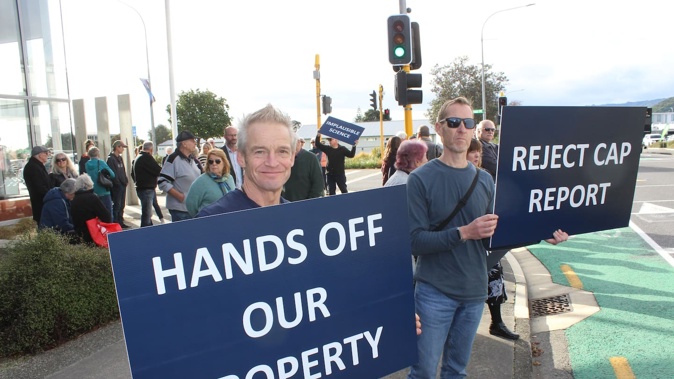
One of the many peaceful protesters outside Kāpiti Coast District Council headquarters, before elected members received a significant coastal report, was longtime resident Tim Rees.
He was among about 50 people along Rimu Rd, Paraparaumu, yesterday holding placards before the council formally received the independent Takutai Kāpiti Coastal Advisory Panel’s recommendations for coastal adaption options.
The Coastal Advisory Panel (CAP) has recommended a series of options – from enhancing to protecting or retreating – for specific coastal areas between Paekākāriki and Ōtaki, and other recommendations.
Rees felt local and central governments were pushing a “crisis” narrative about sea-level rises.
“I’ve lived by Paraparaumu Beach since 1965 and the beach is actually getting bigger.
“For 45 years I’ve dived off Kāpiti Island and the rocks are still at the same height at low tide.
“There’s a gauge in Wellington harbour that’s been there for over 100 years and it goes up between 1mm and 2mm a year.”
He said the report was “scaremongering”, inviting insurance companies “to jump on board and put your rates up”.
Inside the meeting, various members of the public challenged the report, including Tania Lees, from Calm Alarmist Law Madness (CALM).
“We categorically reject their [the panel] findings,” she said.
“Our concerns relate to the lack of community engagement, the extreme climate modelling and the unnecessary harm this is having on the Kāpiti community.
“House values, significant insurance increases and insurance refusal, combined with a recession, high council costs, a looming rates increase and small businesses struggling to stay afloat are causing undue stress for most of us.
“And now our private property rights are under threat, all under the guise of climate change fearmongering.
“The science isn’t settled and there is no consensus.
“We don’t believe the sea levels are rising significantly and [that] we will all be flooded.”
Central and local government couldn’t fund “a process on this scale”, she said.
“So far, the ratepayers have paid in excess of $4 million for the Takutai Kāpiti process.
“We simply can’t afford to spend more.
“If implemented, managed retreat would be in excess of $1 billion.”
If the council accepted the recommendations, she said, it “could potentially be subject to legal action with ratepayers ultimately having to pay the court costs just to protect their own property rights”.
She said the group urged the council to act “in the best interest of the community and [reject] the CAP recommendations”.
“In the event the CAP report is accepted, CALM will pursue options to challenge this proposal every step of the way on behalf of the many who stand with us.”
Protesters make their points clear. Photo / David Haxton
Another speaker, Salima Padamsey, from Coastal Ratepayers United, said the group “begged councillors to think seriously about what is best for Kāpiti and not simply cherry-pick the worst-case scenario”.
“Council can’t rely on this report for anything, especially given its flaws in science, local engagement and co-ordination with the New Zealand Coastal Policy Statement.”
Kāpiti Mayor Janet Holborow said CAP’s work was commissioned in 2019 in response to the outcome of court mediation and concerns raised by community groups.
“Coastal adaptation is a complex issue and we’re grateful to the CAP for completing the work that they were asked to do.
“This involved multiple rounds of community engagement across the district, both in person and online, equating to over 3900 pieces of feedback.
“They also drew on a range of technical experts and evidence, mana whenua knowledge and risk assessments to produce a comprehensive coastal adaptation pathways recommendations report.
“We accept that thinking about coastal change over the next century is hard to do as there is no single source of the truth around what will actually happen.
“Dealing with this uncertainty is not easy. However, CAP has offered advice on how to identify options for the community to consider that align to national requirements.
“Council will now take the time to consider CAP’s recommendations and the supporting information and data.
“No decisions have been made on the CAP’s recommendations.”
The council received the report, thanked CAP for its work and confirmed the advisory panel’s input had concluded, sought feedback from the Insurance Council regarding the report’s findings as well as the Department of Conservation regarding the council’s obligations under the New Zealand Coastal Policy Statement 2010 to take a 100-year perspective. Further analysis would be carried out before the council made any decision about its next steps.
Take your Radio, Podcasts and Music with you









